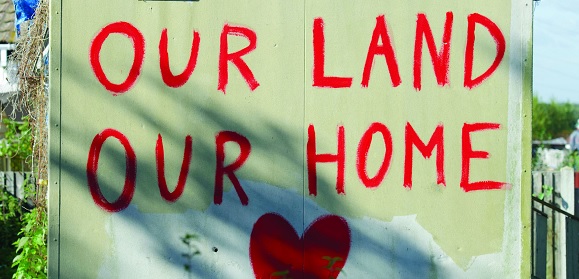Gypsy and Traveller groups are angrily responding to the coalition’s consultation document, which proposes to redefine who can be considered a Gypsy or Traveller for the purposes of meeting obligations under planning law.
A new consultation paper on Planning and Travellers from the Department for Communities and Local Government (DCLG) proposes to redefine what a Traveller or Gypsy is. According to the proposals, they cease to be Gypsies or Travellers, and therefore cease to have specific rights (and councils specific duties towards them in terms of site provision), if they cannot prove they follow a nomadic lifestyle.
If Travellers keep moving, they qualify to rest on a permanent site; if, on the other hand, they have settled (and the reasons for this could range from child care, ill health or to care for an elderly relative), then they are no longer ‘Travellers’ and no duties are owed to them.
For years Gypsies and Travellers have complained that local authorities were not meeting their needs in terms of statutory site provision; and, when they bought their own land, inevitably planning permission was not forthcoming. They are clearly caught in limbo. The answer could have been for the DCLG to pressure local authorities over provision and planning consents, but, instead, it appears to be changing the goal posts, so that fewer people can claim rights.
Of course this is not what the consultation paper says. It purports to be about pressure on the Green Belt and balancing the needs of the settled against those of Travellers. It is hard not to be cynical about Minister Eric Pickles’ attitude though, since, in March 2013, he pledged to ‘stop caravans in their tracks’ and by the start of this year he had rejected 78.9 per cent of all Gypsy and Traveller planning applications put before him. And the Ministerial Working Group on Roma Inclusion, set up to carry out the EU Integration Strategy (whose remit includes Gypsies and Travellers), which Pickles chairs, has not met since April 2012 and has no plans to do so. (The Friends of Families and Travellers was forced to go to the Information Commissioner to wrestle that information from Pickles’ department.)
Refusing to acknowledge reality
The idea that there is ‘one rule for Travellers and another for everyone else’ was popularised in 2005 when the former leader of the Conservatives, Michael Howard, took out a full-page advert in every major newspaper claiming that ‘if you are a traveller you can bend the planning law – building where you like thanks to the Human Rights Act’, which he dubbed a ‘charter for chancers’. This idea has been inherited by today’s Tory defenders of ‘fair play’, Philip Hollobone MP, for instance, who argued in Parliament in July 2013 that Gypsy and Traveller site provision should be scrapped, asking: ‘Why should one category of person be treated differently under the planning regulations from anyone else?’
In fact, they are right: there is indeed one rule for Travellers and another for everyone else, but it’s to the detriment of Travellers. The coalition’s National Planning Policy Framework, set up in March 2012, directed local authorities to provide appropriate accommodation for Gypsies and Travellers, yet the early signs prove that they have been dragging their feet.[1] Meanwhile, Gypsies and Travellers who buy their own land find that their applications for planning permission are refused 90 per cent of the time, compared to the refusal of 20 per cent of all other applications.[2]
The fightback
Yvonne MacNamara, CEO of the Traveller Movement, has warned that the changes now being ‘consulted on’ till 24 November are ‘Kafkaesque’:
Virtually by definition, most Gypsies and Travellers on permanent sites no longer follow the kind of nomadic life that may have been the norm when the ‘gypsy status’ planning category came into being in 1959. By forcing Gypsies and Travellers to live nomadically to be eligible for permanent sites set many Gypsy and Traveller families back 54 years by forcing them back onto the roads and highways.
The redefinition is a reflection of the lack of will to provide for such communities – an attempt by the Communities Secretary to define a problem population out of existence, rather than deal with the problem of unmet need in site provision. Rather than accept his duty to provide for all Gypsy and Traveller families, Pickles has chosen to abdicate partial responsibility. The London Gypsy and Traveller Unit has begun the ‘We STILL Count’ campaign, through which it is calling on Gypsies and Travellers to make themselves aware of the redefinition and respond to the consultation. It warns that the children of families who’ve stopped travelling will also have their need for housing on a site, defined out – the rights of children determined by the means of their parents.
The government’s consultation on planning policy proposals ends on 23 November 2014. To submit a response to the consultation, visit the consultation website here.

